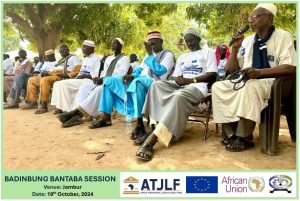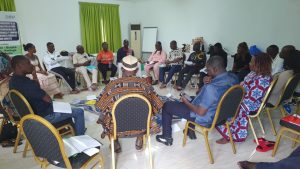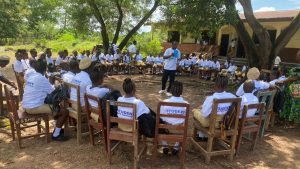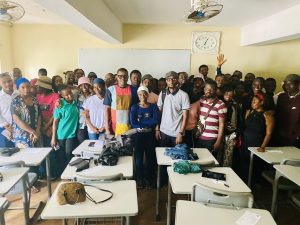“We have been having meetings in this village before concerning the victims but this Badinbung meeting is unique. For the first time, it brings together people from all the five Kabilos of Sintet including our elders, victims and others. We are grateful to Beakanyang for providing us with such a platform for dialogue and reconciliation,”
Lamin Camara, Sintet.
In line with the recommendation of the Africa Transitional Justice Policy (AUTJP) to leverage existing traditional justice mechanisms during transitional justice processes, Beakanyang, a grantee of the Initiative for Transitional Justice in Africa is implementing Badingbung with the aim of promoting accountability and reconciliation in Gambian communities. Supported by the European Union and the African Union, Badinbung seeks to promote a public interfacing between victims and perpetrators on past violations. While providing victims with the platform to share their stories and for perpetrators to acknowledge and apologize, the project is so far promoting reconciliation among hitherto estranged community members.

With sessions already successfully held in Jambur and Sintet, the Bantabas, as the sessions are called, provide a unique platform and safe space for victims, perpetrators and local leaders to interface.The Bantaba sessions have so far reached 190 participants including victims and perpetrators with 34 broken relationships between perpetrators and victims’ families restored. On 19th October 2024, the Jambur Badingbung Bantaba was held at Jambur Lower Basic School in Kombo South District of West Coast Region. The second Badingbung District Bantaba took place in Sintet in Foni Jarrol District on the 29th October 2024. Both sessions were held in spaces that were highly conducive and intentionally designed to be safe for participating victims.
Religious teachings also form a core part of the sessions. Islamic clerics teach on good neighborliness and forgiveness in Islam setting the tone for victims to recount their stories and for perpetrators to seek forgiveness. In an attempt to leverage existing traditional knowledge, facilitators also allow participants especially elders to share their knowledge on the concept of Badingbung, before any allocution.

Despite the success recorded, the Bantabas came with their own challenges. The emotional and psychological impact of bringing up past injustices was a fore challenge for both facilitators and participants. We therefore prioritized empathy, creating a safe space and providing additional support where necessary. This approach allowed participants to feel heard, which fostered healing and encouraged constructive dialogue. It was also a challenge to trace victims in Sintet, a stronghold of former President Yahya Jammeh. This complicated efforts to identify and engage with victims of human rights violations related to the witch hunts. Some victims were hesitant to come forward due to fear of stigma, potential retribution, or concerns that their testimonies might negatively impact the former president based on TRRC recommendations. Another challenge faced was the unwillingness of some perpetrators to join the Badinbung sessions. There was an apparent hesistance to acknowledge their wrongdoings, which, at some point, created obstacles in fostering open dialogue and achieving a balanced reconciliation effort.



